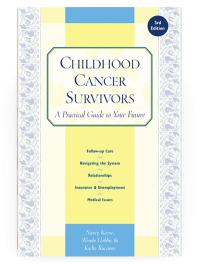Childhood Cancer Survivors
Medical management
Medical management of late effects in the head and neck depends on your symptoms.
Careful orthodonture is necessary if you have crooked teeth, crowded teeth, or an improper bite. Before beginning any orthodonture, the orthodontist will need to carefully examine a full x-ray of the entire mouth to evaluate root length and general health of teeth.
If your spleen was removed during treatment, discuss with your doctor and dentist the need to take antibiotics prior to invasive medical procedures (for example, a colonoscopy). If you have an endoprosthesis (device used to replace cancerous bone), you may also need to take antibiotics prior to dental work to prevent an infection. Be sure to mention the endoprosthesis and ask about antibiotics when you schedule any dental work or invasive procedures.
Sinus medication is usually the first treatment for chronic sinus problems. In some cases, the ear, nose, and throat specialist may recommend watchful waiting to see if you stop having infections as you grow. In other cases, surgery may be necessary to clear out your sinuses and allow for proper drainage of mucus through your nasal passages.
Frequent fluid intake, especially of water, and artificial saliva may be recommended if you have decreased salivary flow.
If you have esophageal reflux, you may be told to do the following:
-
Eat several small meals instead of three big ones.
-
Avoid eating for 3 hours before going to bed.
-
Raise the head of your bed 4 to 6 inches (not with pillows, the head of the bed needs to be raised).
-
Avoid exercising, bending over, or lying down right after eating.
-
Lose any excess weight.
-
Avoid foods that cause more reflux. Some of the most likely to cause problems are acidic foods such as tomatoes or citrus fruits, and spicy or fatty foods.
-
Avoid coffee, tea, chocolate, and alcohol, as they can also worsen reflux.
-
Avoid smoking, because smoke prevents the muscle at the bottom of the esophagus from closing properly. Tobacco also decreases saliva.
-
Try esophageal dilation (i.e., widening of the esophagus). This procedure may be necessary if you suffer from esophageal strictures.
Problems with reflux require an examination by a gastroenterologist who has experience treating survivors of childhood cancer. Your gastroenterologist may recommend antacids (to neutralize stomach acid), motility medications (to help move food through the digestive system), acid suppressers (to reduce heartburn), or acid blockers (to prevent production of stomach acid).
Table of Contents
All Guides- 1. Survivorship
- 2. Emotions
- 3. Relationships
- 4. Navigating the System
- 5. Staying Healthy
- 6. Diseases
- 7. Fatigue
- 8. Brain and Nerves
- 9. Hormone-Producing Glands
- 10. Eyes and Ears
- 11. Head and Neck
- 12. Heart and Blood Vessels
- 13. Lungs
- 14. Kidneys, Bladder, and Genitals
- 15. Liver, Stomach, and Intestines
- 16. Immune System
- 17. Muscles and Bones
- 18. Skin, Breasts, and Hair
- 19. Second Cancers
- 20. Homage
- Appendix A. Survivor Sketches
- Appendix B. Resources
- Appendix C. References
- Appendix D. About the Authors
- Appendix E. Childhood Cancer Guides (TM)

